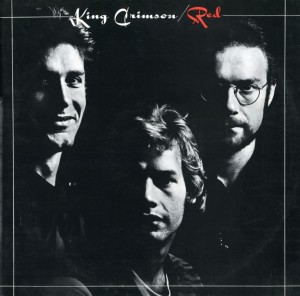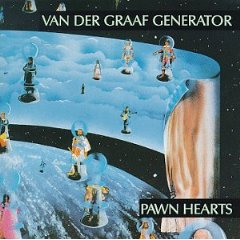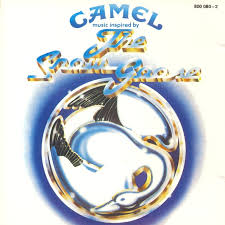“There is no progress in Progressive Rock.”
Those are words I heard over and over again during the recent NEARFest, The North East Art Rock Festival.
Whether I spoke to bassist Patrick Djivas of the Italian rock group, PFM, Roger Triguaux, guitarist with Present or Paul Sears, drummer with The Muffins, they all had the same observation. I’d come to believe it myself.
I came of musical age during the Progressive rock era. Jethro Tull got me playing the flute. Yes, King Crimson and ELP shaped my late high school and early college years. I spent half the 1970s and 80s programming a radio show called Diaspar whose foundation was laid with Progressive Rock. My current show, Echoes, takes its name from a composition by Prog Rock icons, Pink Floyd.
Yet, I don’t feel like progressive rock has been part of my musical life for about 20 years. I subscribed to the conventional wisdom that progressive rock died in 1976 when the Ramones released their first album and was buried in 1977 when Never Mind the Bollocks, Here’s the Sex Pistols came out.
Mind you, I didn’t think that at the time. I resisted punk and waved the Prog Rock flag for a year or two, but eventually the terrain changed. Prog Rock, which seemed to hold the promise of a new tomorrow now seemed like a false dawn, dim and irrelevant.
Most of the classic Prog bands like Genesis, Yes and Gentle Giant had sold out to a more commercial rock sound. King Crimson was on hiatus while founder Robert Fripp was pulled between his ambient Frippertronics and his own attempts at punk relevancy with Exposure. By 1980, I was finding the grandeur of Prog replaced by electronic and space music and even new wave bands like XTC and Ultravox.
But while I was looking the other way, a Progressive Rock Renaissance was slowly gaining speed. It was never in the mainstream music press, but there were magazines popping up like Progression and Exposé. I’d read through these quarterly rags and see names of groups I’d never heard of with references and comparisons to even more obscure bands I’d never heard of: Adachi Kyodai, Trajesdesaliva, Estradasphere, Six Fing Thing are only a few names from one page of Exposé CD reviews. But they’d also have interviews with Robert Wyatt, Gentle Giant and other relics of the progressive era. Each year across the country and in Europe, there were festivals dedicated exclusively to Progressive Rock like ProgDay, BahaProg and ProgWest.
Unexpectedly, at least to me, artists such as Porcupine Tree and Mars Volta put out albums that were actually getting onto the pop charts including Mars Volta’s latest CD, Frances the Mute, which breached Billboard’s Top 5 recently. Listen to these albums and you’ll feel like you’ve rocked back 30 years as these bands unleash choruses of blazing keyboards, and more time changes than Amtrak.
Progressive music shaped many of the artists you hear on Echoes. Musicians like Steve Roach and Robert Rich grew up on the sounds of Yes and King Crimson. Singers like Happy Rhodes were shaped by Jon Anderson of Yes. A few artists like Vangelis, still remain an important part of the Echoes soundscape and the umbra of Pink Floyd is cast over most of the electronic music you hear on the show.
Personally, I still enjoy listening to the edgier side of progressive rock with the chamber goth sounds of Univers Zero and Present and much of the material championed by the Cuneiform label like avant-fusionists The Muffins or the chamber rock sound of Miriodor.
Traveling up to the 2005 NEARfest, the North East Art Rock Festival in Bethlehem on a July weekend, I was prepared for a journey to the past. The Festival has been in existence since 1999, selling out venues from 1000-1850 seats in Allentown and Bethlehem, PA and Trenton, NJ. I’d never been there before, which means I’d missed performances by British Prog artists like Steve Hackett and Camel, Belgian goth denizens Univers Zero and especially the aggressive French band, Magma, whose storm trooper approach to an operatic rock brings to mind Carl Orff on a Harley.
I was attracted this year by Present, The Muffins and Steve Roach, an Echoes stalwart who seemed as far away from the Prog Rock ethos as Frank Sinatra. I was also curious how second tier Prog legends Premiata Forneria Marconi (PFM) and Le Orme from Italy would hold up.
PFM and Le Orme sounded like it was still 1975. The bands looked good for their age, all in their late 50s and early 60s, but nevertheless, they still looked older. Yet their music sounded cryogenically sealed. Keyboard driven with hyper-kinetic drummers and whiplash time changes, both groups played well, but seemed trapped in a time capsule. And you could hear the sound ricochet off the walls of that capsule in groups like New York’s Frogg Café, Norway’s Wobbler and England’s IQ. All these groups would not have been out of place in 1975 opening for Yes or Genesis. The Japanese group, Kenso may have blown those groups off the stage with their high energy performance that started making hairpin turns at 100 mph and never stopped, but they still sounded of a time, some 30 years ago, when they were formed.
Despite quantum advances in keyboard and computer music technology, many of these groups are still using vintage Progrock keyboards, especially the Hammond B-3 organ and the Mellotron. Those keyboards sounded surprisingly fresh 30 years after their prime.
Even more experimental and challenging groups like Present didn’t sound like they’d changed much since they were created 25 years ago. Roger Trigaux has given the lead guitar chores over to his son, Reginald, but the slash and burn approach to a gothic rock sound remains. One disgruntled festival goer characterized them as the “warm up band for hell.” I found it exhilarating and one of the few performances where I wasn’t looking at my watch.
The Muffins also lived up to their reputation. They were always an adventurous group, pushing the parameters of Prog. They’re sound is more fusion than symphonic and they nod to out-jazz like Coltrane and the Art Ensemble of Chicago more than the classical touchstones of most prog bands. They also have horns, a real rarity in progressive music.
The Muffins have always pushed the envelope and stood outside the Prog Rock mainstream, which is why their sound has never been anchored in time. The same could be said of Steve Roach. It’s Roach who throws progressive music into bass relief. Playing a range of pre-programmed synthesizers, customized samples and Australian didgeridoo, he was the only artist who seemed to acknowledge a music world outside the western hemisphere. Le Orme’s Aldo Tagliapietra playing a sitar badly doesn’t count.
Progressive Rock has always been characterized as insular, and while the fans seem to be open minded, the musicians seem content to dwell withing the western classical and rock traditions. To listen to the bands at NEARFest, you’d never know that world music has been a phenomenon of the last 25 years, penetrating jazz, classical, avant-garde, new age and even space music. And that’s surprising given that one of the icons of Progressive Rock, Peter Gabriel, has created the Realworld music label and has been infusing his own music with global elements since the early 1980s. You’d be forgiven in the current atmosphere if you forgot that the first major album cover by Prog Rock artist icon, Roger Dean, who illustrated most of the Yes album covers, was for the African group Osibisa.
The Progrockers on stage also seem blithely unaware of trends related to their own genre. Space music, electronica, techno and ambient, all styles created or influenced by former prog & art rockers like Brian Eno, Robert Fripp, Kraftwerk and others, find little representation in the expansive compositions of mainstream Progressive Rock. Only Roach infused his music with electro-rhythm loops and elaborate sequencers. Granted, he was also the only artist with pre-programmed material in his set. Everything else at the festival was played live, no matter how complicated. Yet, incorporating these other elements or forms into their sound would seem a natural progression for progressive rock.
Whether there has been progress in progressive rock depends on how you conceptualize it. Here’s the definition put forth by NEARFest co-founder, Chad Hutchinson on his ghostland.com site.
“Progressive rock” is a style of music that combines classical music’s sense of space and monumental scope with rock’s raw power and energy. Other musical styles such as R&B, jazz, folk, avant-garde and world music are also frequently incorporated. Arrangements are typically complex, dynamic and multi-dimensional usually featuring intricate keyboard and guitar playing. Dynamics are also an important part of progressive rock. A mixture of loud passages, soft passages and musical crescendos add to the emotion of arrangements, as do extended instrumental solos.
By that definition, a lot of music and possibilities are left out, including Steve Roach whose 45 minute NEARFest set flew from thunder chords to drone zones, techno-tribal rhythms and intricate sequencer matrices. There was nothing rock or dynamic (read bombastic) in the Prog Rock sense at all. Yet, he was embraced by festival organizers and audience alike.
So maybe Progressive Rock isn’t dead as I had thought for these last 20 years or so. But the progress seems to have come from artists who left the fold, like Peter Gabriel and Robert Fripp or Steve Roach. But I bought a couple of signed Roger Dean prints, a sure sign that I ‘d sipped the Kool-Aid, at least for a few days.
TEN CLASSICS FROM PROGRESSIVE ROCK’S GOLDEN YEARS
 King Crimson-Red
King Crimson-Red
The definitive electric guitar Prog album with Robert Fripp and drummer Bill Bruford locking into a headlong charge towards the abyss
 Yes–Tales from Topographic Oceans
Yes–Tales from Topographic Oceans
Their definitive double album epic has everything from soaring keyboard orchestrations to Jon Anderson’s choirboy vocals.
 Genesis–Foxtrot
Genesis–Foxtrot
Watcher of the Skies and Supper’s Ready. What else needs be said about this symphonic-theatrical epic.
 Univers Zero–Heresie
Univers Zero–Heresie
Music from beyond the void. Glorious in it’s frightening gothic cadences and honking bassoons.
 Van Der Graaf Generator – Pawn Hearts
Van Der Graaf Generator – Pawn Hearts
Peter Hammill and crew ably mixing lyrical contemplations on life and epic, but smokey Hammond B-3 instrumental workouts.
 Camel–The Snow Goose
Camel–The Snow Goose
One of the prettier prog bands, this is their crowning conceptual work, with arrangements from David Bedford.
 Mike Oldfield–Ommadawn
Mike Oldfield–Ommadawn
His third album was also his most compositionally integrated, mixing Celtic themes and searing guitar.
 Jade Warrior-Way of the Sun
Jade Warrior-Way of the Sun
The single most under-rated group of the Prog era and one of the few still timeless enough to be played on Echoes. They mixed Asian delicacy with blues-rock edges in this epic, instrumental tone poem, the last in a brilliant quartet of albums on Island.
 Pink Floyd–Meddle
Pink Floyd–Meddle
The band that bridged the gap between psychedelic and Progressive Rock, it contains the serene epic, “Echoes” as well as the propulsive “One of These Days.”
 Can –Soon Over Babaluma
Can –Soon Over Babaluma
The German spacerock bands most melodic and kinetic album of man-machine rhythms, electro-shock guitar and propulsive bass
John Diliberto ((( echoes )))
